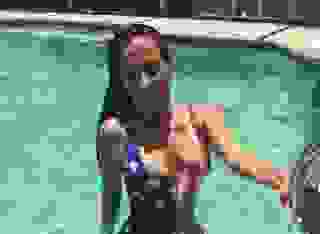Note: You can change font size, font face, and turn on dark mode by clicking the "A" icon tab in the Story Info Box.
You can temporarily switch back to a Classic Literotica® experience during our ongoing public Beta testing. Please consider leaving feedback on issues you experience or suggest improvements.
Click here"Well, either Roddenberry or Einstein was wrong. Just look at how Leonard Nimoy aged after forty years of warp speed space travel. But you're missing the point."
"Which is?"
"A wonder drug doesn't send one crashing through the cosmos at the speed of light," Thurston explained.
"I see," Harj replied, scratching his head absently in apparent consternation. "So you raised a possibility just to shoot it down?"
"It's good form. Doyle perfected it with Sherlock Holmes."
"Ah," sighed Harj, "the game's afoot."
"Indeed," affirmed Thurston. "Now, to the problem at hand. The most direct route to the fountain of youth would be something that slows down or reverses the damage that accumulates to human cells, tissues and organs with the passage of time, rather than affecting the passage of time itself. But I still have to wonder whether they've gone after the problem by direct or indirect means. The indirect approach of altering the passage of time for individuals seems so much simpler and more comprehensive if it were achievable..."
* * * * *
"I'll definitely see what I can do. But I wouldn't pin my hopes on it. Insurance companies are notorious for dragging their feet on approving new benefits. Especially where experimental drugs are involved." She hesitated, placing her hand on Natalie's. "I'm so sorry," she whispered.
Natalie discerned genuine empathy in Joan Ramsden's tone and actions. Joan had been the head of HR at Copter Design Ltd. for the full seven years Natalie had worked there. In fact, she was one of Natalie's closest friends at the company, though that wasn't saying much. "But," Natalie thought, "it's interesting how you gravitate toward people who go out for smoke breaks with you."
After Natalie left the HR counseling room, Joan instructed her gemstone phone to connect her to her benefits advisor at Heartland Assurance, the insurer for Copter's medical, dental and prescription drug benefits. She would negotiate for all she was worth.
Back at her desk, Natalie recalled wisps of last night's conversation with Sam.
"But Nat, you've got to try..." he pleaded.
"I'm not willing to go through radiation or chemotherapy. There's nothing that stops it. The key will simply be to manage the pain," she retorted.
Sam had been momentarily silenced. Then a glow came over his countenance.
"Hey, wait! There's a new drug that Kevvexx is fast-tracking to market. It'll slow down the growth of anything that damages human cells..."
And there it was. A ray of hope. At least for Sam. And after much discussion and brotherly manipulation, Sam had secured Natalie's agreement to pursue it through her company's employee benefits plan.
* * * * *
"It's called TimeWarp," the old research leader coughed. A trickle of blood flowed from the corner of his lip.
Myron let his raised fist, adorned with its designer brass knuckles, drop to his side. He wasn't sure whether the old man's hemorrhage was from a split lip or caused by internal bleeding from the blows to his body.
"Might have been a little too rough on him," thought Myron.
Myron didn't believe in bribing informants. If people who had information he needed wouldn't give it to him freely, he'd beat it out of them. He was a card-carrying member of the macho school of private detection. And he had friends on the police force who could keep him out of hot water, as long as he didn't go overboard. He hadn't killed or maimed anyone - at least not yet.
Myron's moment of concern for his victim (and himself) was swept away by the need for more information.
Myron didn't mince words. Or shred them. Or skewer them.
"Go on," Myron demanded.
"The original idea was for the drug - TimeWarp - to act as an inhibitor." The old man wiped the blood from his lip, exhaling deeply in apparent relief that the attack was over.
"What's an inhibitor?" groused Myron.
"Well, sort of like a preservative or an antibiotic, only with super-strength and super-scope," the man replied, eying Myron warily. "In a similar way that a preservative slows down fungal and bacterial growth in food," he continued, "TimeWarp would slow it down in the human body. We're talking organic material in both instances. Antibiotics work on a similar basis."
"But TimeWarp has super-strength and super-scope?"
"Yes, that's right."
"Sort of reminds me of rabbinic views of God from my days in Hebrew school. Omnipotent and omnipresent," Myron wise-cracked.
"Indeed," replied the researcher gravely. "When you're seeking the fountain of youth, in essence you're playing God."
Switching gears from his unrequited attempt at levity, Myron asked, "Is TimeWarp ready to market?"
He fixed his most intimidating squint on the old man, silently warning him against duplicity, while keeping his un-minced word count intact.
The old man cowered noticeably. "I - I wouldn't say that. Not exactly. We've had some successes, but we've had some failures. We expanded the scope and direction of our research with encouraging results. We're in the process of applying for some new drug patents."
"You expect the insurance companies to cover it?"
"We'll be seeking FDA approval after our clinical trials are complete. FDA approval is the key to getting insurance companies to cover the cost of prescriptions."
"That's all I needed to know," Myron grinned malevolently, "unless you got some papers to back it up."
"No individual has the clearance to get at the documentation. It takes three joint authorizations to access it," assured the researcher.
Myron nodded and left, not wanting to waste further words.
The old man shivered as Myron walked away.
* * * * *
"Forgive me, Father, for I have sinned," whispered Natalie, kneeling reverently in the confessional booth, "it's been three months since my last confession. These are my..."
Natalie faltered, choking back tears. But in the end, she couldn't. Neither could she spit out the word "sins" or the examples that followed. Her shoulders heaved with emotion.
The gentle soul on the other side of the lattice gave Natalie time to let the tears flow, wishing fervently to be on the other side of the screen in order to comfort and console. Alas, hugs were not part of approved Roman Catholic priestly practice. Too much baggage from too many predators.
As Natalie's tears subsided, the priest spoke. "Go on, my child." The words were soothing, as if spoken by a truly loving parent.
"I'm... I'm dying," Natalie revealed.
The priest hesitated, then spoke in a noticeably higher pitch. "And, you are... seeking absolution from your sins?"
Natalie detected an unusual quality in the priest's voice. "I honestly don't know, Father," she replied, "I just needed to talk to someone. Is that okay?"
"Certainly, my child," returned the priest, "I'm used to listening."
Natalie smiled for the first time in two days.
"I... I guess I want to know what's on the other side. And even if that's good, I might still be troubled."
"In what way?" The priest's tone was burgeoning with surprise. Its pitch seemed somewhat out of kilter to Natalie.
"I want to know that my life mattered. That I made a difference."
The priest's smile swelled with parental pride.
"That's good," comforted the priest, "it's the quality of the life that matters, not the length."
"I'm not sure mine boasts a Grade-A quality, Father," rejoined Natalie.
"The message of the gospel is about God's grace and love, not your performance. But your humility is virtuous," encouraged the priest.
Again, Natalie sensed something remarkable in the priest's voice - not just spiritual, but physical and emotional as well.
"I do tend to have a self-defecating sense of humor," Natalie replied with a grin.
The priest laughed a high-pitch cackle, followed by a snort. Self-deprecation had never been expressed in such ribald fashion to the priest's cloistered ears.
"Priests don't laugh," scolded Natalie. In truth, she took a guilty pleasure in breaking through the priestly armor. And that last cackle had parted the clouds of mystery surrounding the unusual quality in the priest's voice.
The priest spoke with candor. "Priests are human beings. Humans laugh. And humans cry."
Silence. Natalie felt herself choking up. Then she heard a rattling sound from the other side of the lattice. Moments later, the knob on the confessor's door slowly turned. The door swung open.
The priest motioned for Natalie to come out of the booth. As Natalie stood, she saw that the priest was indeed, as she had suspected, a woman.
It had been three years since the Vatican endorsed the ordination of women. Though they had finally dispensed with the long-held exclusion of women from the priesthood, the Church could not yet bring itself to drop the priestly moniker of "Father."
The priest reached a hand toward Natalie's hand. Nat spotted a tear streaming down the priest's cheek.
The priest was the first to speak. "Our Lord told his disciples, 'Let not your heart be troubled. You believe in God, believe also in me. In my Father's house are many rooms. If it were not so, I would have told you. I go to prepare a place for you.'"
"So it will be okay on the other side?" Natalie queried tremulously.
The priest smiled. "You believe in God?"
Natalie nodded.
"And that God showed His love and grace toward you through the life, death and resurrection of Jesus?"
Another nod.
"Then you are His disciple, so He was speaking to you."
Natalie smiled tentatively, then asked, "And what about making a difference in this life - living a life that matters?"
"You've made a difference to me, here and now. I'm sure that's just one small sample from a life that matters. And you're not done yet."
Natalie did the unthinkable - she hugged the priest. The priest returned the hug, and allowed herself to weep with those who weep.
* * * * *
"Julia, bring Mr. Fleischmann his payment," Devereaux called gruffly to his executive assistant. Turning to Myron, he said, "No documents, no bonus."
"Fair enough," Myron responded tersely. Two words constituted a lengthy conversation, nearly exhausting his repertoire.
As he waited, Myron noticed the sheen of the overhead light glinting off Armond's shaved head. "Bet he has that Mr. Clean look to ratchet up the intimidation factor," mused Myron. "Maybe I should try it."
Moments later, Myron accepted a wad of bills from Julia, waved a two-fingered goodbye to Devereaux and left the building.
Armond stood, pressing his index finger and thumb into the bridge of his nose. He stomped out of his office and turned the corner, leaving Julia to stare. At the far end of the building, he took a hard left into the office of Harland Bozer, Heartland's chief actuary.
"It's true," Devereaux declared.
"Ever hear of knocking?" Bozer replied casually. Then, without waiting for an answer, he asked, "What's true?"
Devereaux fixed a nasty glare on Bozer. "For being so smart, you can sure be a moron sometimes," he admonished. "The fountain of youth - like we talked about - it's true."
"Oh, shit," responded Bozer, a man not prone to expletives.
"So what'll this do to our annuity portfolio?" asked Devereaux, going straight for the bottom line.
"It depends on the magnitude of the extension of life expectancy," answered the actuary, in typical evasive actuarial fashion. "Those payments are guaranteed for life. With the size of the annuity portfolio, even with offsets in our other lines of business, anything over ten or so years of additional life expectancy would be death to the company. It'll sink us."
"Damn!" replied the president, "I'll have to find a way to stop it. We'll start by leaking some bad press about it - extremely harmful side effects and that sort of thing. And there's no way we'll cover the cost of prescriptions for it under our medical coverages..."
* * * * *
"End call," Joan Ramsden uttered into the gemstone of her ring finger phone. She hung her head in dismay.
"She needs to know sooner rather than later," thought Joan, "procrastination won't change the answer."
She trudged the entire way to Natalie's desk. Procrastination can manifest itself in a variety of unequally insidious ways.
She mustered her courage as she approached Natalie. "I need to speak with you," she advised, "Let's head over to the HR counseling room."
The journey back to HR felt like an eternity to both of them. "At least she's protecting my privacy better than the oncologist's office does," thought Natalie randomly.
As Joan closed the counseling room door behind them, she motioned for Natalie to take a seat.
"No thanks," Natalie insisted, "I can take the news standing up."
"Okay," agreed Joan, "I'll cut to the chase. I just heard back from my benefits advisor at Heartland Assurance. They're refusing to consider any coverage for TimeWarp."
Natalie exhaled forcefully. She looked up to the ceiling, then down to the floor, studiously avoiding any eye contact with Joan. It was easier to keep her composure that way. "Thanks for trying," she managed to whisper.
"I'm truly sorry," Joan empathized.
"I know," Natalie replied. And then she did the somewhat more thinkable. She gave her HR director a hug.
Joan returned her embrace and squeezed back tears.
Natalie didn't return to her desk that day. She gave her brother a call with the news. Then she drove to the beach, took off her shoes and socks, and let the waves lap against her ankles. She enjoyed the feel of the wind whipping her hair into a tangled mess. She listened to the caw of seagulls screaming for human visitors to pitch them a piece of bread. She breathed in the salty scent of the seawater, laced with the rank odor of fish.
She watched fishermen bring in their hauls, and thought about the fishermen among the early disciples. She watched parents holding the hands of their children, raising them above the choking splash of the waves, and thought about a loving heavenly Father raising her out of the storm that raged around her.
She hung around until dark, gorging herself on the visual feast of an amazing sunset splashed by colors from the Artist's palette.
* * * * *
The Steve Miller Band's tune "Fly Like an Eagle" still found frequent air time nearly fifty years after its release. As Sam Beckett brooded over his sister's plight for the umpteenth morning in a row, not wanting to get out of bed, the song played on his clock radio. Its haunting refrain of "Time keeps on slippin', slippin', slippin... into the fyoo-ture..." penetrated Sam's brain like an ice pick.
"That's it," Sam complained, "I can't just sit here waiting for a solution. I've got to make it happen!"
He quickly dressed, forming a plan in his icepick-skewered brain as he moved.
"The testing team is three floors up from sales. My access card works on every floor in the building," he thought aloud. "I can come up with a better-than-lame excuse for being there."
For the first time in weeks, Sam felt a sense of renewed optimism. Each ounce of optimism seemed to weigh that much heavier on the accelerator as he drove to work that morning.
In the end, it turned out to be quite simple. Sam had decided on the direct approach. He would lie as if it were a pathological compulsion. And he'd take some props with him.
Midway through the morning, at the time of his usual coffee break, he rode the elevator to the fifth floor of Building 3 on the Kevvexx campus.
After swiping his access card across the laser security panel, Sam made a beeline for the testing center at the north end of the building. He approached gingerly, recounting his plan point-by-point before initiating his inquiry.
"Hey there, beautiful," he flirted with the homely middle-aged woman seated at the desk in front of the testing center. She was wearing a white lab coat and a pair of oversized goggles.
"Won't work, prick," she countered matter-of-factly.
Sam stepped back a pace. Maybe he'd lost his touch with the ladies. On to plan B.
"Let me start over," he suggested.
"Good idea. Whaddya want?"
"Heartland Assurance has a courier waiting downstairs," Sam began, carefully spinning his yarn, weaving his web of deceit. "They've been given authorization to acquire a sample of two hundred TimeWarp tablets to begin their own third-party testing, so they can determine whether to provide prescription coverage once the drug is FDA-approved. I have the paperwork right here."
He handed the woman a sheaf of paper and his ID card. She peered through her goggles at the three signatures on the form. They looked authentic. That was because Sam had used image technology to lift the executive signatures from a hodgepodge of company intranet documents, then drop them onto the forged authorization form.
She looked at the ID card, then up at Sam's cherubic visage. Sam had years of practice at lying to the ladies. The look of innocence now came as naturally as a bowel movement after a bowl of bran.
"Okay, wait here," she commanded and turned away, passing through the double doors into the testing center.
Sam momentarily feared that she was about to call security. Within seconds, however, she returned with a small plastic bag.
"Two hundred - no more, no less," she stated flatly.
She handed him his ID card, the authorization form, and the bag. Sam offered up a silent prayer of thanks that she wasn't keeping the form. Less evidence to nail his lying hide to the wall of criminal activity.
"Have a nice day!" he gushed, winking at the stoic woman in the goggles and lab coat.
"Yeah, whatever," she replied.
It was time to make a slick exit. It was also time to beat the bushes.
Sam dropped the bag into his backpack in the trunk of his car and headed off to begin his circuit of doctors' office visits. Doctors made their rounds, pharmaceutical salespeople made theirs. With experience, Sam had learned to time the circuit in such a way that the doctors were nearly always in. Sort of like mutual biorhythms.
All day long, he looked forward to the look on Natalie's face. He drove to Natalie's place after work that day to deliver his treasure. The optimistic accelerator got him there in virtually no time at all after his final office visit. He grabbed his backpack from the trunk.
When Natalie invited him in, Sam practically bounded into her living room. "Have a seat," she encouraged. It was good to see Sam so excited.
He sat, but kept in constant motion. Natalie recalled the way he'd bounce around while playing video games as a boy. She half expected him to pee his pants like he sometimes had when he'd gotten lost in the rush of Street Fighter II as a 7-year old.
When Sam failed to speak - perhaps his facial muscles were frozen by the goofy grin - Natalie asked nonchalantly, "What'cha got?"
Sam pulled the small plastic bag out of his backpack. At thirty-three, the trappings of high school were still evident in Sam's accessories as well as in his mindset. "It's something to help you out," he beamed, handing her the bag.
"What is this?" she inquired, looking at perhaps two hundred yellow plastic wrappers, each stamped with a "TW" stencil and each containing a tiny spherical pill.
"TimeWarp," he announced proudly, "enough to last at least six months. One a day is the recommended dosage."
Natalie's face registered unbridled astonishment. "Where did you get them?" she asked.
"From the lab at Kevvexx. They were free samples," he lied.
Natalie's eyes conveyed her disapproval without the need for words.
"I know what you're thinking," he insisted, "You think I should deliver them to doctors, who would then dispense them to patients. But the doctors can't dispense them until they're FDA-approved. And that could take another year. Time that you don't have."








